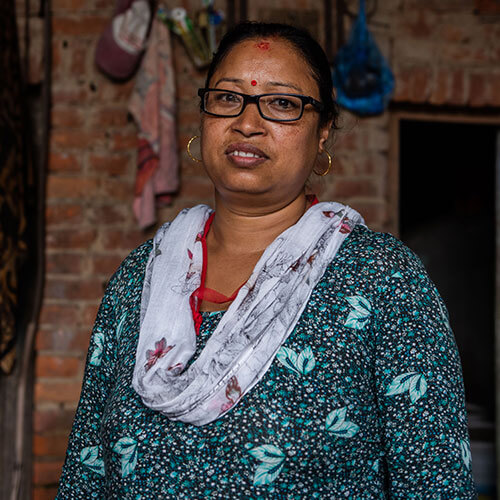Worker disappeared in 2003
FACTS

Mr Nakarmi who worked as an ironmonger in Bungmati was arrested and taken from his home on 23 September 2003, by half a dozen security personnel members of the Royal Nepalese Army (RNA). Several people witnessed the arrest namely his wife Ram Maya Nakarmi, his mother Mrs Raj maya Nakarmi and his brother Mr Puspa Narayan Nakarmi.
In June 2006, the security personnel informed his wife that her husband had been arrested and taken away for interrogation at Bhairab Nath Barracks but no further details was given. This was the last time Mrs Nakarmi had any contact with her husband.
Read more here
Procedure
Following the arbitrary arrest of her husband, Mrs Nakarmi visited for two years Bhairab Nath Barracks in Maharajgunj and Lagankhel barracks in Lalitpur. The security personnel always denied that Mr Nakarmi was being held there.
On 4 January 2007, Mrs Nakarmi filed a writ of mandamus before the Supreme Court of Nepal against different offices of the government and several specific individuals from the RNA. The same year the Supreme Court ruled on the Habeas Corpus of 83 disappeared persons. The death of Mr Nakarmi due to torture under RNA custody was mentioned in one of the 83 writs examined by the court.
In January 2012, represented by TRIAL Mrs Ram Maya Nakarmi and Ms Luman Nakarmi submitted an individual communication to the Human Rights Committee regarding the enforced disappearance of Mr Padman Narayan Nakarmi their husband and father.
On 10 March 2017, the Human Rights Committee found Nepal responsible for the violation of the right to life, the prohibition of torture, the right to personal liberty and the right to recognition as person before the law in respect of Mr Nakarmi.
Read the decision: English
RECOMMENDATIONS
The Human Rights Committee recommended that Nepal carry out a thorough and diligent investigation and prosecute and punish those responsible. To locate and hand over to the family the remains of Mr Nakarmi in case of death. To also, provide adequate compensation, satisfaction and the necessary psychological rehabilitation and medical treatment to the wife and minor daughter of Mr Nakarmi.
| Investigation of the facts and prosecution and sanctions of the perpetrators | |
| Nepal has failed to adopt measures with regards to the investigation, prosecution and sanction of those responsible. Nepal continues arguing that investigation into conflict-related crimes must be carried out by transitional justice bodies in spite of the well-established case law of the Committee that recall that transitional justice mechanism cannot replace judicial remedies in cases of gross human rights violations. | |
| Detailed information about the investigation and concrete plan to locate the remains and hand them over to the family. | |
| No information has been provided to the family regarding the investigation nor any concrete plan to locate, exhume, identify and return the mortal remains of Mr Nakarmi to his family. | |
| Adequate psychological rehabilitation and medical treatment | |
| No measure has been taken or implemented in order to provide medical treatment and psychological help to the family of Mr Nakarmi. | |
| Provide adequate measures of satisfaction | |
| No measures have been taken regarding the public apologies and the recognition of the state’s international responsibility, as asked by the wife and daughter of Mr Nakarmi. | |
| Provide adequate measures of compensation | |
| Although the government considers support of the interim relief as compensation, such support cannot replace the compensation victims should receive. The family of Mr. Nakarmi has not received any form of compensation for the harm suffered. | |
| Amendment of domestic legislation on torture, enforced disappearance and arbitrary execution | |
| Albeit the new Criminal Code (entered into force in 2018) codifies the autonomous offences of torture and enforced disappearance, the definitions of the crimes enshrined therein and the corresponding regulation – concerning, for instance, statutes of limitation and compensation – remains at odds with international law. Further, there are no separate or special laws on extrajudicial executions. |
Note these are unofficial gradings as the Human Rights Committee has not yet commented on implementation
EFFORTS FOR IMPLEMENTATION
- Letter of 28 August 2017 to the Office of the Attorney General
- Letter of 17 August 2017 to the Ministry of Law and Justice
- Letter of 15 August 2017 to the National Human Rights Commission
- Letter of 13 November 2017 to the Human Rights Unit of the Office of the Prime Minister
- Follow up report to the Human Rights Committee, November 2017
- Numerous letters sent to Human Rights Unit of the Office of the Prime Minister, Ministry of Law and Justice, National Human Rights Commission, Office of Attorney General, Ministry of Peace and Reconstruction in August and November 2017
- Joint follow-up report submitted to the Human Rights Committee, October 2018
- Collective Follow-up report to the Human Rights Committee, June 2020
